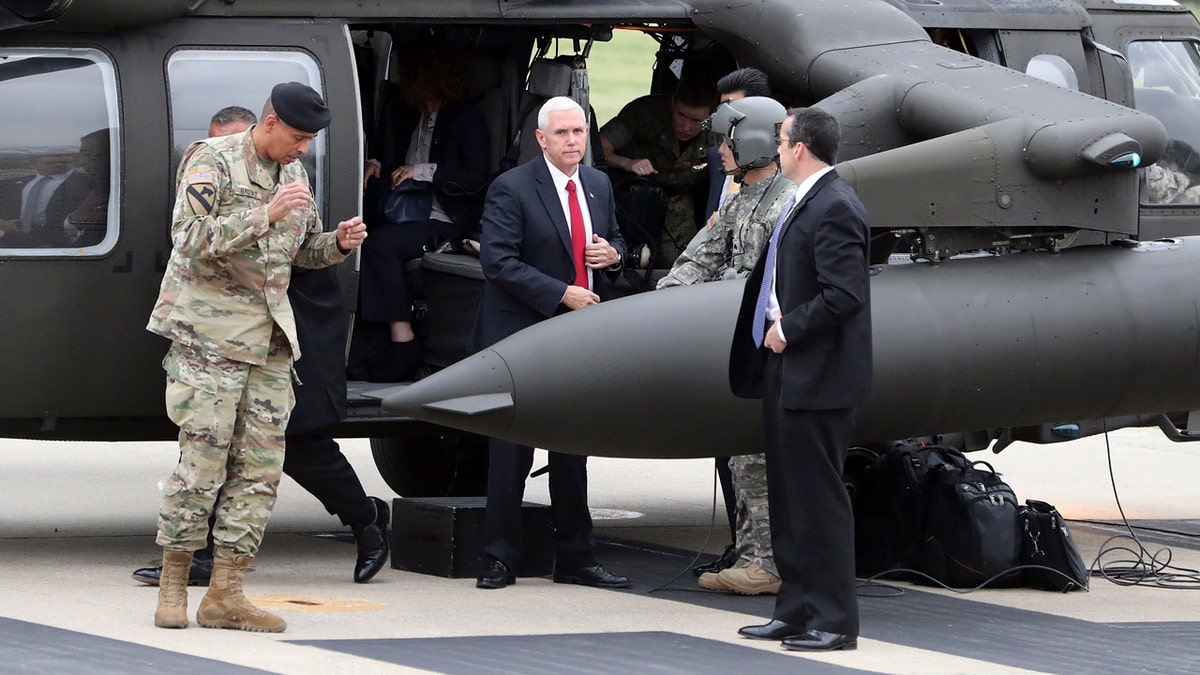
U.S. Vice President Mike Pence, center, arrives at Camp Bonifas outside of the Demilitarized Zone (DMZ), near the border village of Panmunjom, in Paju, South Korea, Monday, April 17, 2017. U.S. Vice President Pence visited a military base near the Demilitarized Zone separating North and South Korea a day after the North conducted a failed missile launch. (AP Photo/Lee Jin-man) (Copyright 2017 The Associated Press. All rights reserved.)
Vice President Mike Pence visited a military base near the Korean Demilitarized Zone Monday, a day after North Korea conducted a failed missile launch.
Pence arrived at Camp Bonifas on Monday morning for a briefing with military leaders and to meet with American troops stationed there. The joint U.S.-South Korean military camp is just outside the 2.5-mile-wide DMZ.
A day earlier, Pence had described the attempted North Korean launch as a "provocation" that underscored the risks faced by American and South Korean service members.
PENCE SAYS NORTH KOREA'S LATEST 'PROVOCATION' SHOWS THE RISKS TO MILITARY
"Your willingness to step forward, to serve, to stand firm without fear, inspires the nation and inspires the world," Pence told U.S. military personnel during a fellowship meal following Easter services at U.S. Army Garrison Yongsan.
"Our resolve has never been stronger, our commitment to this historic alliance with the courageous people of South Korea has never been stronger and with your help and God's help, freedom will ever prevail on this peninsula," Pence went on.
The vice president's trip to South Korea marked the start of a 10-day trip to Asia, during which he will be tasked with explaining the Trump administration's North Korea policy, which U.S. officials have dubbed "maximum pressure and engagement." Pence will aim to reassure allies in South Korea and Japan that the U.S. will take appropriate steps to defend them against North Korean aggression.
A North Korean missile exploded during launch on Sunday, U.S. and South Korean officials said. The high-profile failure, which occurred while Pence was in the air over the Bering Sea, came as the North tried to showcase its nuclear and missile capabilities around the birth anniversary of the North's late founder and as a U.S. aircraft carrier neared the Korean Peninsula.
Meanwhile, Trump's national security adviser cited the president's recent decision to order missile strikes in Syria after a chemical attack blamed on the Assad government as a sign that the president "is clearly comfortable making tough decisions." But at the same time, H.R. McMaster said, "it's time for us to undertake all actions we can, short of a military option, to try to resolve this peacefully."
In a broadcast interview that aired on Sunday, McMaster said the U.S. would rely on its allies as well as on Chinese leadership to resolve the issues with North Korea. "I mean, North Korea is very vulnerable to pressure from the Chinese," McMaster said on ABC's "This Week."
The bottom line, McMaster said, is to stop the North's weapons development and make the Korean Peninsula nuclear-free: "It's clear that the president is determined not to allow this kind of capability to threaten the United States. And our president will take action that is in the best interest of the American people."
The Associated Press contributed to this report.



